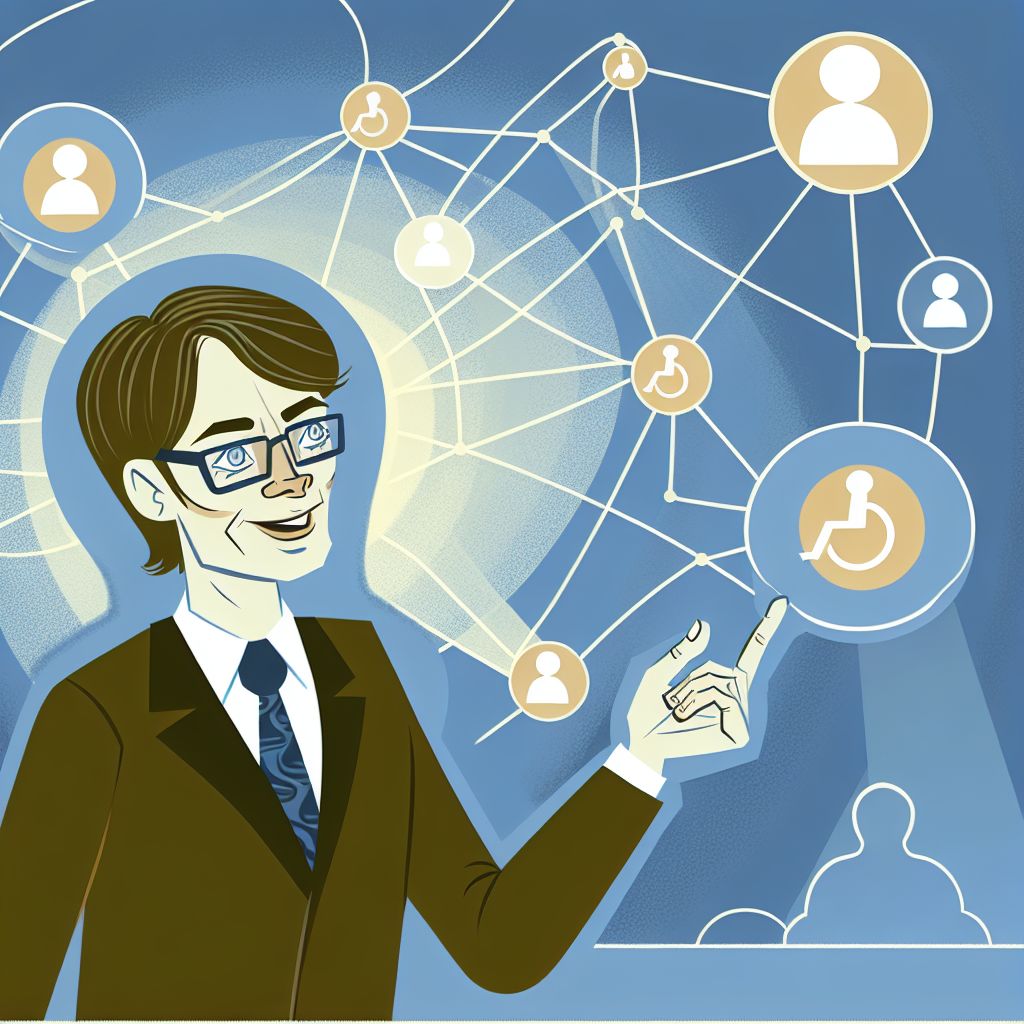Responsibilities of Disability Services Coordinators
As disability services coordinators, it is essential to effectively manage and coordinate services for individuals with disabilities.
This includes assessing their needs, developing care plans, and ensuring access to necessary resources and support.
Support networks play a crucial role in assisting disability services coordinators in their responsibilities.
These networks provide a platform for sharing best practices, collaborating with other professionals, and seeking guidance on complex cases.
One of the key responsibilities of disability services coordinators is to advocate for the rights and needs of individuals with disabilities.
This often involves working closely with clients, families, and healthcare providers to ensure that their voices are heard and their needs are met.
Support networks offer a valuable source of emotional support for disability services coordinators.
Coordinators often deal with challenging and emotionally demanding situations.
By connecting with peers who understand their unique challenges, coordinators can find encouragement and validation in their work.
Additionally, support networks provide opportunities for professional development and learning.
Disability services coordinators can benefit from the knowledge and expertise of their colleagues.
Gaining new insights and strategies can improve their practice.
Support networks are essential for disability services coordinators to fulfill their roles effectively.
By leveraging the resources and connections available through these networks, coordinators can enhance the quality of care and support they provide to individuals with disabilities.
Support Networks for Disability Services Coordinators
Providing emotional support for the challenges faced in the field is crucial.
As disability services coordinators, the nature of the job can be emotionally taxing.
Support networks offer opportunities for networking and collaboration with peers in the industry.
Connecting with others who understand the unique challenges can be incredibly beneficial.
Benefits of Emotional Support
Having a support network can help disability services coordinators navigate difficult situations.
Whether it’s a challenging client case or a tough decision, having a sounding board can make a difference.
Transform Your Career Today
Unlock a personalized career strategy that drives real results. Get tailored advice and a roadmap designed just for you.
Start NowEmotional support can prevent burnout and improve mental health.
The demands of the job can take a toll, and having a support system can help reduce stress.
It can also prevent feeling overwhelmed.
Networking and Collaboration
Support networks provide opportunities to network and collaborate with peers.
Building relationships with others in the field can lead to new ideas, partnerships, and professional growth.
Collaborating with others in the industry can lead to improved services for clients.
By sharing knowledge and best practices, disability services coordinators can enhance the quality of care they provide.
Creating a Strong Support Network
Seek out professional organizations and online communities for disability services coordinators.
These platforms can help you connect with others in the field and access valuable resources.
Attend conferences, workshops, and training sessions to meet fellow professionals.
These events offer opportunities to network, share experiences, and learn from experts in the field.
Utilizing Support Networks Effectively
Actively participate in support networks by attending meetings, sharing ideas, and seeking advice.
Engaging with peers can help you stay connected and informed about industry trends.
Be open to feedback and different perspectives from your support network.
Embrace opportunities to learn from others and consider how you can apply new insights to your work.
Support networks play a vital role in the professional development and well-being of disability services coordinators.
By providing emotional support and opportunities for networking and collaboration, these networks contribute to a more fulfilling and successful career in the field.
Types of Support Networks
Professional organizations provide a platform for disability services coordinators to network with their peers.
They attend conferences and workshops, and access resources for professional development.
These organizations often offer training opportunities, certifications, and guidelines for best practices in the field.
Transform Your Career Today
Unlock a personalized career strategy that drives real results. Get tailored advice and a roadmap designed just for you.
Start NowThey also advocate for the rights of individuals with disabilities.
They work to improve access to services and support.
Joining a professional organization can help disability services coordinators stay up-to-date on the latest trends, research, and policies in the field.
It can also provide a sense of community and camaraderie.
Members share common goals and challenges.
By participating in these organizations, coordinators can build valuable connections, exchange ideas, and collaborate on projects.
These efforts enhance the quality of services they provide.
Some popular professional organizations for disability services coordinators include the National Association of Rehabilitation Professionals in the Private Sector (NARPPS), the American Network of Community Options and Resources (ANCOR), and the National Association of State Directors of Developmental Disabilities Services (NASDDDS).
Online Forums and Discussion Groups for Sharing Resources and Experiences
Online forums and discussion groups offer a convenient way for disability services coordinators to connect with colleagues across the country and around the world.
These platforms allow coordinators to ask questions, seek advice, share resources, and exchange best practices.
One of the key benefits of online forums is the ability to access a wealth of knowledge and expertise from a wide range of perspectives.
Coordinators can learn from others who have faced similar challenges and brainstorm solutions.
They can gain insights into innovative approaches to service delivery.
These platforms also provide a sense of solidarity and support.
Members offer encouragement, empathy, and practical tips for managing the demands of the job.
Some popular online forums for disability services coordinators include the Community of Practice for Supporting Families, the Council of Parent Attorneys and Advocates (COPAA) forum, and the National Council on Independent Living (NCIL) listserv.
Learn More: Case Management and Crisis Intervention Techniques
Support Networks for Disability Services Coordinators
Benefits of Being Part of a Support Network
Being part of a support network as a disability services coordinator provides access to various professional development opportunities and training sessions.
These opportunities are crucial for staying up-to-date with the latest trends and best practices in the field.
Through these training sessions, coordinators can enhance their skills and knowledge, ultimately improving their ability to support individuals with disabilities effectively.
Transform Your Career Today
Unlock a personalized career strategy that drives real results. Get tailored advice and a roadmap designed just for you.
Start NowMoreover, these opportunities allow coordinators to expand their network, connect with other professionals in the field, and exchange ideas and strategies.
One of the significant benefits of being part of a support network is the opportunity to increase knowledge and expertise in serving individuals with disabilities.
By engaging with other professionals, coordinators can learn from their experiences, share best practices, and gain new insights into effective strategies for supporting individuals with disabilities.
This exchange of knowledge and expertise can help coordinators broaden their understanding of different disabilities, develop innovative approaches to service delivery, and improve overall outcomes for individuals with disabilities.
Explore Further: Recognizing and Addressing Vicarious Trauma in Counseling
Challenges Facing Disability Services Coordinators
As a disability services coordinator, you are tasked with overseeing and coordinating support services for individuals with disabilities.
While this role is rewarding, it comes with its own set of challenges that can impact your day-to-day work and overall well-being.
Burnout and Compassion Fatigue
Burnout and compassion fatigue are prevalent issues faced by disability services coordinators.
The nature of the job, which involves constant exposure to the emotional toll of supporting individuals with disabilities, can take a significant toll on coordinators’ mental and emotional health.
The emotional labor involved in empathizing with individuals facing challenges can lead to burnout if not managed effectively.
Coordinators may find themselves feeling emotionally drained, overwhelmed, and lacking motivation to continue their work.
This can negatively impact their ability to provide effective support and care to those they serve.
To prevent burnout and compassion fatigue, coordinators must prioritize self-care practices.
This includes setting boundaries, practicing mindfulness, seeking support from peers or supervisors, and taking regular breaks to recharge.
By prioritizing their well-being, coordinators can better sustain themselves in their role and continue to make a positive impact on the lives of those they support.
Meeting Diverse Needs
Another significant challenge for disability services coordinators is meeting the diverse needs of individuals with disabilities.
Each person has unique requirements, preferences, and goals, which can vary greatly from one individual to another.
Coordinators must be adept at navigating these differences and tailoring their support services accordingly.
Providing personalized and tailored support services requires coordinators to be flexible, resourceful, and empathetic.
They must be able to adapt to changing circumstances, think creatively, and collaborate with other professionals to meet the needs of those they serve effectively.
Transform Your Career Today
Unlock a personalized career strategy that drives real results. Get tailored advice and a roadmap designed just for you.
Start NowThis can be demanding and time-consuming, requiring coordinators to constantly assess and adjust their approach to ensure they are providing the best possible support.
See Related Content: Navigating Child Custody Issues in Domestic Violence Cases

Strategies for Building and Maintaining Support Networks:
Attending conferences and workshops:
Participate in industry events to connect with peers and stay updated on best practices.
Networking for continued education:
Build relationships with professionals in the field to exchange ideas and learn from each other.
Joining professional organizations:
Become a member of associations related to disability services to access resources and support networks.
Utilizing social media:
Connect with like-minded individuals on platforms such as LinkedIn to stay connected and informed.
Engaging in peer support groups:
Join groups or forums where you can share experiences and seek advice from others in similar roles.
Participating in Mentorship Programs:
Seeking guidance:
Find a mentor who can provide valuable insights and help navigate challenges in your role.
Building a support system:
Develop a supportive relationship with your mentor to receive encouragement and feedback when needed.
Learning from experienced professionals:
Benefit from the wealth of knowledge and experience that mentors can offer to enhance your skills.
Setting goals and objectives:
Work with your mentor to establish clear goals and create a plan for professional development and growth.
Transform Your Career Today
Unlock a personalized career strategy that drives real results. Get tailored advice and a roadmap designed just for you.
Start NowProviding mentoring opportunities:
Pay it forward by offering mentorship to others in the field to share your expertise and support their growth.
By implementing these strategies, disability services coordinators can build strong support networks that will help them excel in their roles and make a positive impact in the lives of individuals with disabilities.
You Might Also Like: Public Health Social Work and Emergency Preparedness
Importance of Support Networks for Disability Services Coordinators
Support networks are crucial for disability services coordinators to thrive and provide effective support for individuals with disabilities.
Professionals in the field must actively seek out and utilize these support networks for personal and professional growth.
By connecting with others in similar roles, coordinators can share resources, knowledge, and experiences to improve their practice.
Support networks provide a space for coordinators to discuss challenges, receive feedback, and access professional development opportunities.
Ultimately, having a strong support network can help disability services coordinators feel empowered, motivated, and more capable in their role.
As the field continues to evolve, it is essential for coordinators to stay connected and engaged with their support networks to effectively meet the needs of individuals with disabilities.
Therefore, I highly encourage professionals in this field to actively participate in support networks to enhance their skills, knowledge, and overall impact in the disability services community.
Additional Resources
Administration on Aging | ACL Administration for Community Living
Minnesota Department of Human Services / Minnesota Department …




